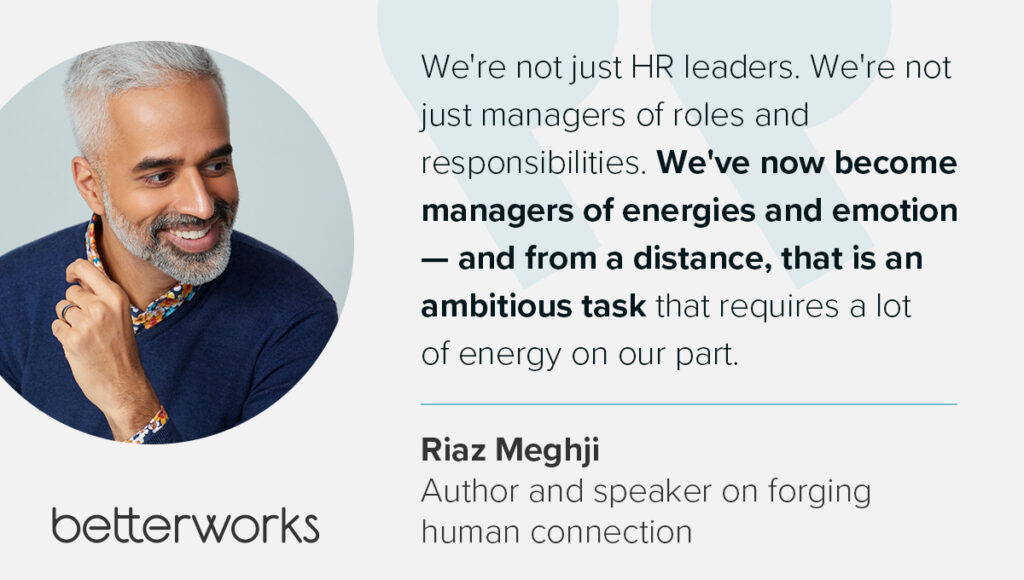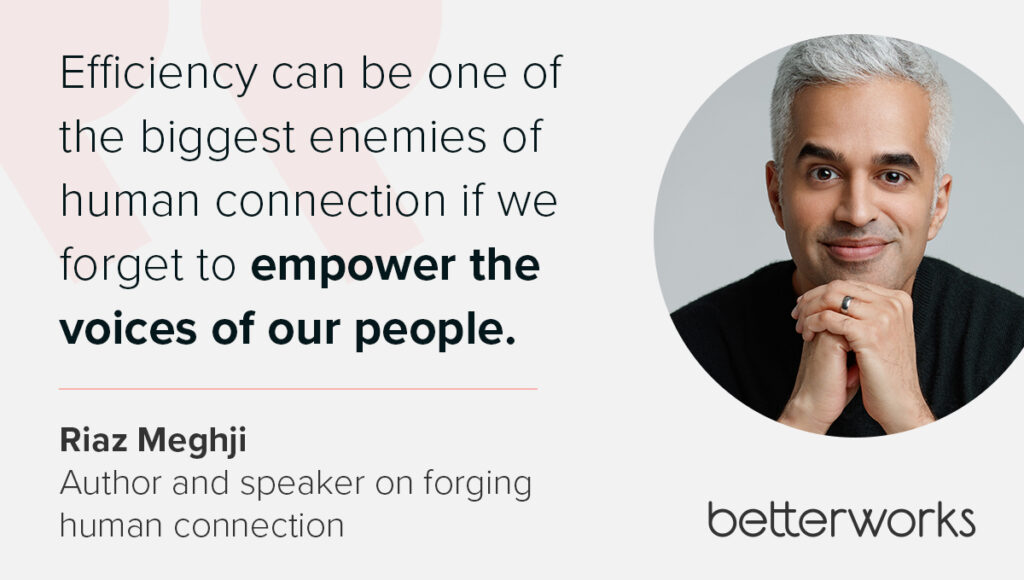Loneliness in the workplace isn’t just a minor issue — it’s a quiet crisis that’s costing businesses billions of dollars in lost productivity. But the solution to this escalating problem could be as simple as leaning into more conversations.
“If there’s any silver lining of these past couple of years, it’s removing the stigma associated with opening up with the confession of, ‘I am feeling isolated. I am feeling lonely,’” says Riaz Meghji, human connection speaker and author of “Every Conversation Counts: The 5 Habits of Human Connection that Build Extraordinary Relationships.” He’s also speaking at the upcoming People Fundamentals webinar session “Every Conversation Counts: Building High-Performance Organizations One Relationship at a Time.”
“Addressing what people are feeling — and navigating with intention as leaders, as HR leaders, to make sure we understand who our people are, what they need, how we can connect this group — is going to be important as we move forward in 2024 and beyond,” Riaz says.
We talked with Riaz ahead of his People Fundamentals session to learn more about fostering connections and conversations to get to know each other at a human level.
Lead with empathetic curiosity
Recognizing and addressing the emotional needs of your team is crucial for maintaining a healthy and productive work environment. “We’re not just HR leaders. We’re not just managers of roles and responsibilities,” Riaz says. “We’ve now become managers of energies and emotion — and from a distance, that is an ambitious task that requires a lot of energy on our part.”
Riaz proposes empathetic curiosity as the solution. Empathetic curiosity involves assuming positive intent and asking questions that show you care and want to understand, rather than making assumptions or judgments. “In any organization, or even our personal relationships, there may be behavior that we don’t understand,” Riaz says.

Empathetic curiosity is about more than just listening; it’s about creating a space where employees feel seen, heard, and valued. “Lead with that empathetic curiosity to understand what is driving this emotional intensity. Is it fear? Is it shame? Is it loneliness? Is it guilt?”
This approach not only helps in understanding the underlying causes of employee behavior but also creates a supportive environment where everyone feels valued and respected. This consistency in showing genuine care can transform your team dynamics, leading to a more cohesive, motivated, and productive workforce.
Create space for human connection
With more remote and hybrid work arrangements than ever before, it’s not surprising that people are feeling lonely. It’s challenging to replicate the scope of human interaction when you’re limited to video conference calls — but it can be done. “In a virtual space, I believe it takes much more effort to create these pockets of spontaneity,” Riaz says.
Leaders must be willing to model communications that build trust — even if that means showing vulnerability. “Go first and be the one that asks for help, because a lot of the time, people are scared to show that they don’t know,” Riaz says. For example, that might look like exploring what meaningful recognition looks like to different people or learning what makes employees “come alive.”
One effective approach is to be intentional with the questions you ask and to give employees space to interact authentically. For instance, consider starting the week by asking your team, “What’s one word to describe your weekend?” This simple yet powerful question helps you understand where people are at and shows that you care about their well-being. Another tactic is to ask questions that elicit reflection, not just a quick answer.
Engaging quiet learners is also crucial when leading with intention. “They may not be the extrovert that initially jumps in and vocalizes, but they have an important perspective,” Riaz says. “So I think those points of connection can happen in the meeting with the pockets of space we create.” To make sure their voices are heard, try creating space for their input by asking intentional questions and rotating who facilitates meetings. This approach helps ensure everyone has a chance to contribute.
Empower efficiency through connection
In the quest for productivity, it’s easy to prioritize speed and output over meaningful interactions. “Efficiency can be one of the biggest enemies of human connection if we forget to empower the voices of our people,” Riaz says. However, true efficiency isn’t just about getting things done quickly; it’s also about creating an environment where employees feel valued and connected.

Leading with empathy and understanding can transform the way your team operates. “Now more than ever, it’s important to double down on these aspects, on these touch points where people feel, ‘I can still speak up. My voice is still going to be heard. My leaders care about me,’” Riaz says.
Creating space for genuine connection helps you make sure efficiency doesn’t come at the cost of humanity. Instead, you create a workplace where people feel appreciated and understood, which naturally boosts engagement and performance. When you balance efficiency with a real commitment to human connection, you build a resilient and motivated team that thrives even when times get tough.
To learn more about Riaz’s strategies for fostering conversations and connections at work, register for the webinar.
Conversations that connect


